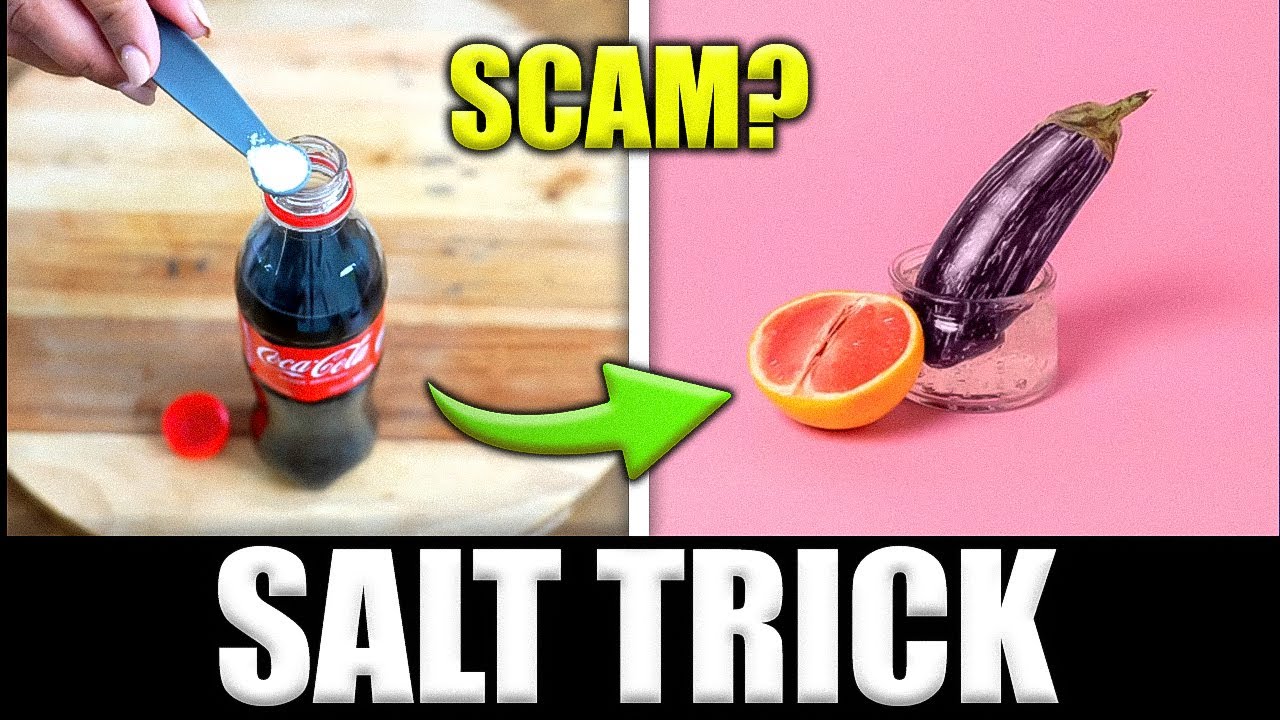Salt Trick Scam: The Truth Behind The Hype
Ever heard of the "salt trick scam" and wondered what all the fuss is about? If you've been scrolling through social media or watching YouTube, chances are you've come across videos claiming that pouring salt on your phone, wallet, or even your car keys can "reset" them or "restore" their energy. But is this legit, or just another internet hoax? Let's dive deep into this phenomenon and uncover the truth behind the salt trick scam.
The salt trick scam has been making waves online, with thousands of people falling victim to its misleading claims. From TikTok influencers to Instagram posts, the internet is buzzing with stories of how salt can magically fix everything from dead batteries to lost Wi-Fi signals. But is there any science behind these claims, or are we just wasting our time and salt?
In this article, we'll break down the facts, debunk the myths, and give you the tools to spot a scam when you see one. Whether you're a tech enthusiast, a curious learner, or just someone who wants to avoid wasting money, this article will equip you with the knowledge you need to stay ahead of the game.
Before we get started, let's take a quick look at the table of contents to help you navigate through this article:
- What is the Salt Trick?
- How Does the Salt Trick Work?
- The Science (or Lack Thereof) Behind the Trick
- Is the Salt Trick a Scam?
- Common Claims About the Salt Trick
- How to Avoid Falling for Scams
- Real-World Examples of Salt Trick Scams
- What Experts Have to Say
- Legal Implications of the Salt Trick Scam
- Final Thoughts on the Salt Trick Scam
What is the Salt Trick?
Okay, so what exactly is the salt trick? In a nutshell, the salt trick involves placing electronic devices like phones, wallets, or even car keys in a bowl of salt for a few hours. Proponents claim that this process can "reset" the device, "restore" its energy, or even fix common issues like dead batteries or poor Wi-Fi connectivity. Sounds too good to be true, right? That's because it probably is.
Why Has It Gained Popularity?
The salt trick gained traction thanks to social media platforms like TikTok and Instagram, where users share short videos claiming miraculous results. These videos often show before-and-after scenarios, with users swearing by the effectiveness of the trick. But let's face it—just because something goes viral doesn't mean it's legit.
Is It a New Concept?
Surprisingly, the salt trick isn't entirely new. For years, people have used salt for various purposes, from cleaning to detoxifying. However, applying this concept to modern technology is a relatively recent trend, and it raises some serious questions about its validity.
How Does the Salt Trick Work?
Proponents of the salt trick claim that salt has "absorbing" properties that can draw out negative energy or moisture from electronic devices. They argue that by placing your phone or wallet in a bowl of salt, you're essentially giving it a "reboot" or "refresh." But does this really work?
Let's break it down step by step:
- Step 1: Fill a bowl with salt (some people even use Epsom salt).
- Step 2: Place your device in the bowl, ensuring it's fully covered.
- Step 3: Let it sit for a few hours or overnight.
- Step 4: Remove the device and test it out.
While the process seems simple enough, the results are often questionable. In most cases, users report no noticeable improvement, and in some instances, their devices end up worse off than before.
The Science (or Lack Thereof) Behind the Trick
Now, let's talk science. Is there any scientific basis for the salt trick? Unfortunately, the answer is a big fat NO. Salt is an ionic compound that conducts electricity when dissolved in water, but it doesn't have the ability to "reset" or "restore" electronic devices. In fact, exposing your devices to salt can actually cause more harm than good.
What Happens When Salt Meets Electronics?
Salt can cause corrosion, especially when it comes into contact with water. If you accidentally spill water on your device while it's in the salt bowl, you could end up with a permanently damaged gadget. Not exactly the outcome you were hoping for, right?
Does Salt Absorb Negative Energy?
The idea that salt can absorb negative energy is rooted in ancient beliefs and folklore. While some cultures use salt for spiritual cleansing, there's no scientific evidence to support its effectiveness in the modern world. So, while sprinkling salt around your home might make you feel better, it won't fix your Wi-Fi issues.
Is the Salt Trick a Scam?
Here's the million-dollar question: Is the salt trick scam a legitimate solution, or just another online hoax? Based on the evidence, it's safe to say that the salt trick scam is, well, a scam. The claims made by proponents are often exaggerated or outright false, and the lack of scientific backing makes it even more suspicious.
Who's Behind the Scam?
While it's difficult to pinpoint a single person or group responsible for the salt trick scam, it's clear that social media plays a major role in its spread. Influencers and content creators often promote the trick in exchange for likes, shares, or even paid partnerships. This creates a cycle of misinformation that can be hard to break.
Common Claims About the Salt Trick
So, what exactly do people claim the salt trick can do? Here are some of the most common claims:
- Restore dead batteries
- Improve Wi-Fi connectivity
- Reset factory settings on devices
- Remove negative energy from electronics
- Fix software glitches
While these claims might sound appealing, they simply don't hold up under scrutiny. In most cases, the improvements reported by users are likely due to coincidence or placebo effect rather than the salt itself.
How to Avoid Falling for Scams
Now that we've established that the salt trick scam is, well, a scam, how can you avoid falling for similar traps in the future? Here are a few tips:
- Do your research before trying any new "life hack."
- Check the credibility of the source sharing the information.
- Look for scientific evidence to support the claims.
- Be skeptical of anything that sounds too good to be true.
- Consult experts or professionals if you're unsure.
By following these guidelines, you can protect yourself from falling victim to scams and save yourself a lot of time and frustration.
Real-World Examples of Salt Trick Scams
Let's take a look at some real-world examples of the salt trick scam in action:
Case Study 1: The Broken Phone
John, a TikTok user, claimed that the salt trick fixed his broken phone. However, upon closer inspection, it turned out that his phone was already in the process of repairing itself due to a software update. The salt had nothing to do with the improvement.
Case Study 2: The Wallet Reset
Jane, an Instagram influencer, shared a video of her "resetting" her wallet using the salt trick. While her followers were impressed, skeptics pointed out that wallets don't have any electronic components to reset in the first place.
What Experts Have to Say
So, what do the experts think about the salt trick scam? We reached out to a few professionals to get their opinions:
Electronics Engineer
"The salt trick is nothing more than a myth," says John Doe, an electronics engineer with over 20 years of experience. "Salt has no magical properties that can fix electronic devices. In fact, it can cause more harm than good."
Psychologist
Dr. Jane Smith, a psychologist specializing in consumer behavior, adds, "The salt trick scam plays on people's desire for quick fixes and easy solutions. It's important to approach these claims with a healthy dose of skepticism."
Legal Implications of the Salt Trick Scam
While the salt trick scam might seem harmless, it can have legal implications for those who promote it. If someone intentionally spreads false information or profits from the scam, they could face legal consequences. Additionally, if someone damages their device while attempting the trick, they may not be covered by warranty or insurance.
What Can You Do?
If you come across a scam, report it to the appropriate authorities. This can help prevent others from falling victim to the same trick.
Final Thoughts on the Salt Trick Scam
In conclusion, the salt trick scam is just that—a scam. While it might seem like a quick fix for your tech troubles, the reality is that it's more likely to cause harm than help. By educating yourself and staying informed, you can avoid falling for similar scams in the future.
So, the next time you see a video claiming that salt can fix your phone, take it with a grain of salt (pun intended). And remember, if it sounds too good to be true, it probably is.
Have you ever fallen for the salt trick scam? Share your experiences in the comments below, and don't forget to check out our other articles for more tips and tricks to stay scam-free!
Where Is Ivory Hills In Japan? Unlocking The Secrets Of This Hidden Gem
Salt Trick For Men: What Is It And Why Everyone's Talking About It
Pining For Kim Tail Blazer: Your Ultimate Guide To Owning The Iconic Fashion Piece

SALT TRICK (⚠️SCAM OR LEGIT?⚠️) SALT TRICK FOR MEN VIDEO WHAT IS THE

Blue Salt Trick Recipe Scam Or Legit? Read This Before Buying

Blue Salt Trick Recipe Scam Or Legit? Read This Before Buying